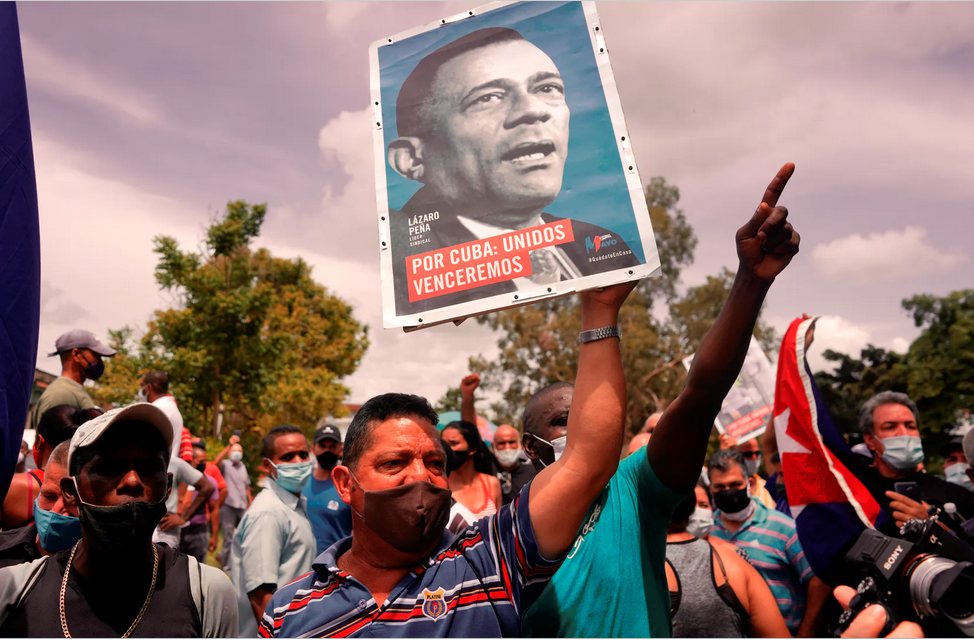
Yvon GrenierJJuly 19, 2021
“While the nationwide popular protests of July 11-12 in Cuba prompted governments around the world to take clear stands on this unprecedented event, the Trudeau government was hesitant,” writes Yvon Grenier. – Reuters
Original Article: Trudeau’s Cuba Contortions
YVON GRENIER • Guest Opinion
Yvon Grenier is a professor, department of political science and resident fellow, Mulroney Institute of Government, St. Francis Xavier University, Antigonish
That was an interesting week in Canada-Cuba relations! While the nationwide popular protests of July 11-12 in Cuba prompted governments around the world to take clear stands on this unprecedented event, Ottawa was clumsy and hesitant.
As of July 19, Prime Minister Justin Trudeau had made two short comments, and only when pressed by journalists to speak about Havana’s repression of those protests.
On July 13, Trudeau gave a dry run to a neutral statement: “Canada has always stood in friendship with the Cuban people,” and added: “We have always called for greater freedoms and more defence of human rights in Cuba. We will continue to be there to support Cubans in their desire for greater peace, greater stability and greater voice in how things are going.”
Couldn’t that comment be applied to almost any country — even democratic and stable ones?
This hesitancy to point the finger at the Cuban regime was not a surprise from this prime minister. He got into trouble for his strange tribute to Fidel Castro in 2016, saying, for instance, that Castro’s “supporters and detractors recognized his tremendous dedication and love for the Cuban people.” No, his detractors will never recognize that.
That was only days after a gushing speech he delivered at the University of Havana, in which he said, astonishingly, that amicable relations with communist Cuba was “one of the ways we reassure ourselves that we are our own country.” Canada’s national identity must be pathetically weak indeed.
Back to the present. On July 15, as the Cuban dictatorship’s repression could not be denied, came Trudeau’s second statement — again prompted by a pesky journalist (Got to love them!): “We’re deeply concerned by the violent crackdown on protests by the Cuban regime. We condemn the arrests and repression by authorities of peaceful demonstration.”
He added: “We stand, as we always will, with the people of Cuba who want and deserve democracy, freedom and respect.”
He did not shift the blame to the U.S. embargo, as the NDP and other voices from the left did, in chorus with countries like Iran and Russia. (The NDP statement also mentions the party’s “support for the fundamental rights of freedom of expression and assembly.”)
Meanwhile, Global Affairs Canada went on automatic pilot. On July 13, according to the CBC, a spokesperson described how they were “closely monitoring the situation in Cuba,” and dusted off some boilerplate statements on how “all parties” should “exercise restraint” and “engage in peaceful and inclusive dialogue.”
Those normally apply to violent conflicts with two or more armed groups, not to a violent government crackdown of peaceful protests. Global Affairs reiterated that “Canada supports the right of freedom of expression and assembly.” But again, absurdly, it called “on all parties to uphold this fundamental right.”
During that week, Global Affairs made public statements on Foreign Affairs Minister Marc Garneau’s meetings with both the U.S. Secretary of State Antony Blinken, and the UN High Commissioner for Human Rights, Michelle Bachelet, both of whom had already made clear and forceful statements on the situation in Cuba. Global Affairs mentions discussions on many countries: Haiti, Afghanistan, Belarus, Venezuela, Nicaragua, others. But not Cuba, even though it was most probably discussed.
In 2016, when a Canadian journalist asked Trudeau point-blank if the regime built by Fidel Castro was a dictatorship, he responded (after a pregnant pause) “yes.” A hint of reason over passion; or at least, over a very Canadian naiveté, afforded by decades of unthinking “engagement” with a repressive regime. Recent developments forced the Trudeau government to turn off the automatic pilot and really think about how Cubans are ruled.
In all likelihood, Canada will “continue to be there to support Cubans” if and when they undertake a transition to democracy. There might be some muddling through getting to that point, but the arc of Trudeau’s aggiornamento on Cuba now seems to point in the direction of reason governing a more mature policy toward this beautiful country moving forward. It just took a crisis to get out of the comfort zone.


